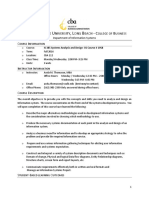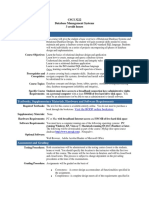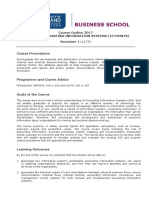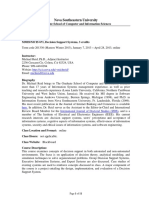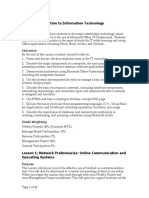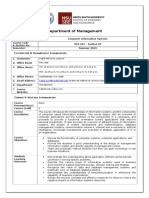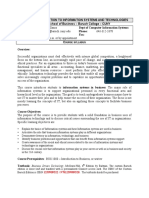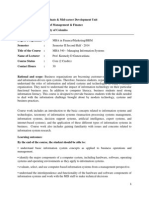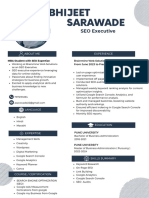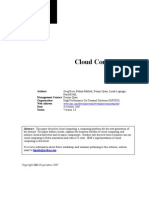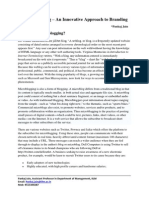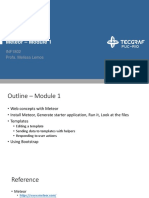IDS 406: Business Systems Design Project Spring 2008 Tuesdays, 9:30-12:00 PM, 185 BSB Instructor information
: TA information : Prof. Ranganathan C (Ranga) Office : To be announced Office : UH 2428 Tel : 312-996-2847 Fax : 312-413-0385 E-mail : ranga@uic.edu Office hours : To be announced Office hours : To be announced
(Each group will meet with me for at least 30 minutes every week at a time to be determined) CONTENT, OBJECTIVES AND PHILOSOPHY This course focuses on the processes of analyzing a business problem and analyzing, designing, and implementing an information system (usually, but not necessarily, a computerized system) to solve that problem. The design, implementation and use of such systems have become an essential element of organizational survival and competitiveness. The course presents a broad overview of the tools, techniques and methodologies used in the systems analysis and design process. Managerial and organizational issues concerning analysis and design will also be discussed. The main objectives of the course are to familiarize you with the concepts of structured system development, the design tools, techniques and methodologies, and to introduce the basic skills required for the development of computer-based systems. It is assumed that you have some basic knowledge of systems analysis and design, databases, and programming (hopefully at the level provided by IDS 405, IDS 410, and IDS 201); thus, we will be able to make it more practical and applied as a project oriented course.
The course's main objectives are: To familiarize you with the application of basic systems analysis and design tools, techniques and methodologies. To generate a pragmatic understanding of the processes of analysis, design end implementation of computer-based information systems in organizations. To apply class-room knowledge to a real-life project situation To provide opportunities to develop and sharpen appropriate communication and business skills. The basic philosophy of this course is that the most effective way to learn the systems analysis and design process is to "learn by doing", and that teamwork is critical. The work in the class will be mostly by teams, and your grade will be determined (to a large extent) by the performance of you and your team. We will concentrate on projects that have been selected for this course which are REAL projects for REAL client sponsors. The sponsors of these projects devote considerable time and resources to this course. Consequently, YOUR PERFORMANCE in the sponsors environment will affect the good name of the school and our future relationships with these sponsors. The team performance will be much affected by the satisfaction of your clients. The implications of this philosophy for you are clear; you will have to commit more of your time than is usually required for other courses in the school. Your commitments include:
Spending half a day each week, as a group, on your client's premises; all of the sponsors expect this. If you cannot fulfill this requirement you will be unable to satisfactorily perform the required work and should drop the course. Meeting with me, as a group, at least once a week for at least half an hour. Conducting the necessary research, analysis and design, work, as demanded by the project. Preparing and typing a number of reports, as well as preparing several class and client presentations. You will find it advantageous to rehearse for those presentations. Reviewing as necessary the material in the text.
From my past experience, this course and the project would require a commitment of at least 10 hours (or more) of work per week, depending on the specific project requirements. TEXTBOOK Jeffrey Hoffer, Joey George and Joseph Valacich, Modern Systems Analysis and Design, Fifth Edition, Prentice Hall, 2004, ( Text book web site : http://www.prenhall.com/hoffer ) A supporting text is Technical Writing: A Practical Approach by William S. Pfeiffer, fourth edition, Prentice Hall, 2000, ISBN 0-13-021372-1. This text will not be discussed in class, but it is a great support and reference for the preparation of reports, presentations, etc. COURSE DELIVERY The approach taken is pragmatic, rather than theoretical, with the objective of increasing your familiarity with the course topics. I do not intend to "read the text in class". Rather, I will emphasize certain issues, and will respond to your questions. You must read on your own and be familiar IN ADVANCE OF EACH CLASS with the assigned material as given in the schedule, and with the chapter slides available in the course web site. The course will be more discussion and presentation oriented than is normally the case in other courses. In particular, ALL questions and comments are welcome. COURSE MANAGEMENT AND PROCEDURES Classes will be devoted to discussing key concepts, discussing elements pertaining to projects, and answering your questions. In addition, it is expected that work on your projects may require additional reading, from the text or other sources, on particular subjects related to the projects. Such reading should be done at your own initiative. Any questions pertaining to such reading will be welcome throughout the course. Many skills are required of successful analysts - one of the most important being communications skills. Because of its importance, considerable emphasis will be placed on communication activities. Throughout the course each team will present its work to the class and to its client, and discuss their findings and conclusions with both. To this end, each team will submit the following: A WEEKLY group progress report (hard-copy) An individual BLOG reporting learning/progress made by each student. A preliminary report outlining the selected project, its objectives and its scope An intermediate report describing the team's progress up to the middle of the semester A final report summarizing the team's work and recommendations, and The team's work-papers. All the reports are to be given to me at the beginning of the weekly classes so that I can study them and contact the teams in a timely fashion, if necessary. All the reports must be typed, double-spaced. Be
�careful to assure that you do not send or submit a virus-infected report such a report will automatically get a grade of zero, regardless of content. The intermediate and final reports will also be presented in class and at the client's premises (if required). ALL the members of each team will deliver these presentations, i.e., each team member wi1l have to present some part of each of these reports. Each team will maintain well-organized work-papers. I may inspect these periodically during the semester. The teams might be required to present their final project in the clients premises / student project expo at the end of the semester. COMMUNICATIONS & PREREQUISITES A common theme in the IDS sequence of courses is the development of your communications skills and use of available computer technology and common software tools. You are expected to be familiar with word-processing and spreadsheet tools, and submit your work using such tools. You are also strongly suggested to use e-mail for all communications pertaining to the course and I suggest that you use your UIC email accounts for this purpose. Make sure your email programs are virus-free. Opportunities to tap into information sources available, for example, on the Internet, World Wide Web will present themselves throughout the course. Most of the course material can be printed out from the World Wide Web, at my Course Info Site. Those not familiar with the Web should go to the CBA PC Lab and consult a friend or a TA there. The Blackboard/Course Info site will be used for course administration purposes that distribution of online material, assignment downloads and uploads, communication of grades etc. It is expected that you have completed all the prerequisites for admission to this class (including a former introductory information system class). I expect that each of the students had past courses in system design and analysis and / or databases, and preferably both. These prerequisites may be checked, and students lacking them may not register to this class without my prior approval. ASSIGNMENTS, QUIZZES AND EXAMS Assignments will be announced in class from time to time. Late submissions of any assignments will not be accepted. All assignments are due, unless otherwise specified, in the next class (i.e., a week) after they have been announced, at the beginning of the class. Assignments should all be typed (using computerized office tools) and be professionally presented. Assignment due-dates as given in the schedule or in class will be strictly adhered to and late assignments will NOT BE ACCEPTED. There will be no exams. Rather, each class session (except the first one) may include a brief open-book or closed-book quiz. The quizzes are intended to test your understanding of the reading material and related concepts. Hence it is very important that you come PREPARED with the assigned reading material for the class. This system eliminates the pressure for final exam preparation, allows timely grade progress feedback, and motivates students to prepare for each session (and thus increase the probability of quality participation and getting the most from the class sessions).
�ATTENDANCE, PUNCTUALITY AND HONOR CODE You are expected to attend all classes, weekly meetings and are responsible for all announcements made in class/weekly instructor meetings. You are also expected to attend all the weekly meetings with me, and your weekly company visits. Irregular attendance to the class/ weekly company visits/ instructor meetings, and in your group meetings are likely to affect your grades. Makeup of quizzes or assignments will be given only by prior approval before the quiz or assignment, and only under extreme circumstances such as a medical emergency. Punctuality is highly regarded; no student, if arriving late, will be given any extra time to complete a quiz, nor will makeup quizzes be offered. Similarly, reports submitted late, for whatever reason (unless I approved that) will be downgraded. Non-attendance may also reflect negatively on your class presentation and report presentation grades. The university's honor code will be adhered to. Cheating will result in an automatic failing grade in the course for all those students who are deemed to have consciously contributed to the cheating. The project sponsors are very enthusiastic about having the students work on their projects. However, you may be required to adhere to certain norms and guidelines required by the organizations. It is important that you understand the organizational requirements and norms well, and comply with them. Your conduct and performance at the sponsor organizations is extremely important. You should discuss with me any problems or issues you face at the sponsor organizations. Your grade in the course will be affected if any of your actions are likely to affect the schools cordial relationships with the organization. GROUP WORK The primary objective of the group-work is to learn from each other and also contribute to collective learning from the group. All group members are expected to know and understand the work done by their fellow team members and contribute equally to the group project. I shall assess the progress of the project as well as the individual contributions of the group members during my interactions with the groups. GRADING The course grade will be derived from the following elements Assignments 20% Team project 60% Quizzes & Contribution to Class learning (professional conduct, attendance, class participation, assessment of weekly meetings etc.) 20% The team project portion of the grade would be assessed based on the following : Class presentations: each presentation will be evaluated with respect to its contents and showmanship" (i.e, appearance, contact with the class audience, use of visual aids, etc) Preliminary report, weekly progress reports and work-papers: these will be evaluated on contents, completeness of coverage, and their usefulness in judging each team's progress, plans ant problems. Intermediate report: this will be evaluated on its contents, completeness of coverage and presentation format, which includes grammar, spelling and readability. Final report: this wi1l be evaluated in the same manner as the intermediate report. Project deliverables. Project management. Weekly meetings; continuous learning through weekly assignments/work Attendance, contribution to group work and learning, professional conduct in the company. (Keep in mind that grades can be affected by the feedback of your client, as well as by my evaluation of the performance of the team and the individual team members.)
�TENTATIVE COURSE SCHEDULE
(May change over the semester, you will be updated if this happens)
Class Dates Number 1 Jan 15
Topic Course Introduction, Selection of projects & groups
Chapter in Book
Jan 22
3 4 5 6 7 8 9 10
Jan 29 Feb 5 Feb 12 Feb 19 Feb 26 Mar 4 Mar 11 Mar 18 Mar 25 Ap 1 Apr 8 Apr 15 Apr 22 Apr 29 May 1st week
Introduction to SDLC; Managing IS project and Project Management Managing IS project and Project Management Identifying Systems projects; Project Initiation and Planning Systems Requirements; Introduction to Data modeling Preliminary Project Presentations* Data modeling Process Modeling Logic Modeling Intermediate Project Presentations* Designing Databases; Designing forms, dialogue, interfaces and Design specifications
4,5 6,9 9 7 8
reports, 10,11,12,13
No class or Weekly meeting Spring Break
Systems Implementation and Maintenance Review of project management practices Project review week Final Project Presentations* Course Wrap-up 15,16
11 12 13 14 15
** Exam Week, No Final - Presentation at Sponsor's Sites / Expo ** * Preliminary / Intermediate and Final project reports are due on the day the presentations are scheduled. (Assignments and the deadlines will be announced in class from time to time.) [Organization visits and Weekly meetings with instructor happen throughout the semester]
�Guidelines for Weekly Reports Your weekly report (one submission per group each week must be typed) should highlight the following (Treat this like a professional memo you will write to A VP/CIO reporting the weekly activities): a. The Date, time and duration of your weekly organization visit that week (also include information about the people you met) b. The dates, timings and durations of group meetings you had that week (include information about who were present/absent) c. Bullet-listed outline of what your group accomplished during (a) your organization visit and (b) in your group interactions d. Any other information pertaining to any concepts/skills you learnt or implemented in that week e. Highlight contribution of EACH member in the group towards learning and the project. (What did each member accomplish in that week? you can also use their blogs to learn about their activities) f. Other information that you feel is appropriate, or as suggested by instructor. Each group/member is suggested to maintain a folder for the project that contains all details about the project, weekly reports and other document related to the project. The weekly report should be submitted each week, at the start of weekly instructor meeting. Guidelines for BLOGs Your weekly report (atleast one Blog entry per week) should highlight the following : Your learning pertaining to IDS 406 and the project in the week Progress in your project activities Your experience in the organization Any new learning relevant to IDS 406 Other information, as suggested by instructor from time to time.
�Suggestions for conduct at organizational Premises 1. You are expected to be very punctual during your organization visits. Be there on time (NO DELAYS). 2. Suggested dress code : Formal. 3. You are expected to adhere to all rules, procedures and norms of your client organization. 4. Make your own notes during your meetings with organizational members. 5. Check with your instructor and get the approval before you sign any documentation (eg: nondisclosure agreements, internship applications, any tests etc). with the client organization. 6. You are expected to act very professional in your interactions and communications with the organizational members. 7. All submissions or deliverables you make to the organization need to be done professionally. 8. Consider yourself as a team within the organization. Act responsibly and professionally. 9. Do NOT tamper with any of the organizational equipments or properties. You will be solely responsible for any damages you may cause to the property/equipments in the client organization. 10. Make sure that your floppies, files etc are virus-free. 11. You are expected to treat all the information related to the project as strictly confidential. Do not take, use or transmit any project related information to outside parties. 12. You may be required to use the UIC lab for doing some of your work. Make sure your work achieves the objectives for which it was proposed. 13. Manage your time at the organization well. You need to plan your time well so that your project goes on smoothly. 14. Id suggest you to use separate files/folders for all your project-related activities.
�College of Business Administration Jan 2003 University of Illinois at Chicago Honor Code for the College of Business Administration As an academic community the College of Business Administration at the University of Illinois at Chicago is committed to providing an environment in which teaching, learning, research, and scholarship can flourish and in which all endeavors are guided by academic and professional integrity. All members of the college community students, faculty, staff, and administrators share the responsibility of insuring that high standards of integrity are upheld so that such an environment exists. In pursuit of these high ideas and standards of academic life, as a student I hereby commit myself to respect and uphold the University of Illinois at Chicago (UIC) College of Business Administration Honor Code during my entire matriculation at UIC. I agree to maintain the highest moral and ethical standards in all academic and business endeavors and to conduct myself honorably as a responsible member of the college academic community. This includes the following: Not to seek unfair advantage over other students, including, but not limited to giving or receiving unauthorized aid during completion of academic requirements; To represent fact and self truthfully at all times; To respect the property and personal rights of all members of the academic community. An abbreviated version of the Honor Code pledge may be printed on course syllabi, exam booklets, and other uses as deemed appropriate. The abbreviated version is as follows: This course and its associated coursework are being administered under the policies of the University of Illinois at Chicago (UIC) College of Business Administration Honor Code. All students are expected to respect and uphold this code. Honor Code Violations and Enforcement Violations of the Honor Code are just causes for discipline under the University of Illinois at Chicago Student Disciplinary Procedure, and all allegations of Honor Code violations shall be handled pursuant to that Procedure. (For a complete description of just causes for discipline, disciplinary procedures, and sanctions, see the pamphlet Student Disciplinary Procedure of the Senate Committee on Student Discipline, available from the Office of the Dean of Students, SSB, Suite 3030, 1200 W. Harrison St., M/C 318.) Honor Code Council The Honor Code Council shall be formed consisting of two faculty members elected by faculty vote and six student members (two graduate students and four undergraduate students) appointed by the Assistant Dean for Student Services through recommendation of the Deans Advisory Council (DAC). Each member will serve a term of one academic year, beginning in August. The Council shall elect a chairperson and a secretary. The duties of the Honor Code Council shall include: Recommend changes in the Honor Code. Inform all students, staff, and faculty of the Honor Code and the procedures to be followed for pursuing alleged Honor Code violations. Ensure that the Honor Code is prominently displayed within the College of Business Administration and on course syllabi and exam booklets. Ensure that the Honor Code and related information are accurately described in the Graduate and Undergraduate catalogs. Work with the Office of Student Services to include the Honor Code in its promotion of the University of Illinois at Chicago College of Business Administration to potential students. Work with college administration to ensure that the Honor Code statement is signed by all students prior to their enrollment in the college. Inform all UIC faculty, staff, and students of the Honor Code of the College of Business Administration, and encourage the adoption of its principles.




